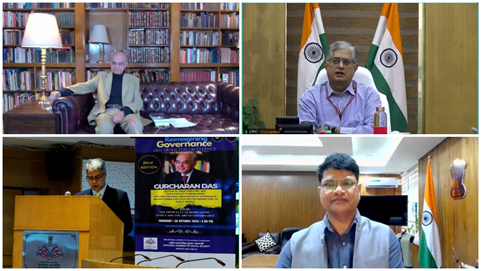The Employees’ Provident Fund Organisation recently organised another thought-provoking session in its ongoing series aimed at enhancing leadership and moral standards among public servants. This latest event brought together hundreds of officials to listen to insights from a prominent thinker who has excelled in both business and literature.

Exploring Moral Challenges Through Ancient Wisdom
In his main talk, the speaker delved into the complexities of making righteous choices when handling authority. He used stories from an ancient Indian epic to illustrate how leaders face tough ethical questions every day. According to him, managing public affairs is fundamentally about upholding values, and it demands constant effort to balance kindness with bravery and inner integrity.
He explained that true effectiveness in service comes from viewing people as individuals rather than just cases on paper. By referencing a key concept from another classic text, he encouraged everyone to carry out their roles without seeking personal gains or worrying too much about results. This approach, he said, leads to better outcomes for society.
Lessons from a Real-Life Success Story
Sharing experiences from his time leading a major company, the guest narrated the journey of an ordinary employee who started as a security personnel on night shifts. Through consistent interest in learning, modest behaviour, and genuine dedication to his job, this person climbed the ranks to a top position. The core message here was clear: what truly drives progress is not just smartness but the right mindset, including eagerness to grow and care for colleagues and the work itself.
He stressed that putting plans into action matters more than just planning. Building an environment where getting things done and helping others take priority over mere talk is essential for any organisation.
Interactive Exchange on Building Ethical Guidance
The session included a lively question-answer segment. One senior official inquired about developing a reliable inner sense to navigate unclear situations involving right and wrong. The response highlighted that no fixed rule applies everywhere, and improving this internal guide involves following principles of fair leadership and trusting one’s initial instincts, as rational excuses often come later.
Appreciating the organisation’s current changes, the speaker motivated further steps to make procedures easier and leverage digital tools for greater openness, speed, and user-friendliness.
Leadership Reflections on Responsibility
The head of the provident fund body reflected on how the ideas shared align perfectly with their role in safeguarding people’s savings. He emphasised the need to stay impartial, clear in operations, and answerable to the public at all times.
The academy’s director explained that these monthly gatherings serve as opportunities for officials to step back, think deeply, and renew their commitment to principled administration. Past editions have sparked real changes, such as new training programs focused on empathy following a talk by a well-known social activist, and creative problem-solving workshops based on innovation themes.
Wrapping Up with Practical Inspiration
The person facilitating the discussion captured the essence by calling it a guide for handling today’s complex challenges in public service, much like battles in legendary tales. He expressed gratitude for turning abstract ideas of morality into relatable and applicable advice.
Nearly eight hundred participants from various parts of the country joined this virtual or in-person meet. The academy continues this tradition every month, inviting experts to discuss topics like integrity, serving the nation, and achieving high standards in administrative roles.
Such initiatives play a vital role in shaping a more responsive and value-driven bureaucracy. They remind everyone involved that excellence in governance goes beyond rules and procedures; it rooted in personal character and continuous self-improvement.
Events like this not only boost knowledge but also foster a sense of purpose among officers. As the organisation pushes forward with modernisations, blending age-old wisdom with contemporary practices seems to be a winning strategy.
For those in public service or interested in leadership ethics, these discourses offer valuable perspectives. They show how timeless stories can address modern dilemmas, encouraging a shift towards more humane and effective systems.
In a nutshell, the gathering reinforced that good governance thrives on compassion, action-oriented attitudes, and an unwavering moral foundation. As reforms continue, such intellectual engagements will likely drive even greater positive impacts.
Staying updated with these developments helps understand how public institutions evolve to better serve citizens. Keep an eye on similar programs that blend philosophy with practical administration for inspiring breakthroughs.
